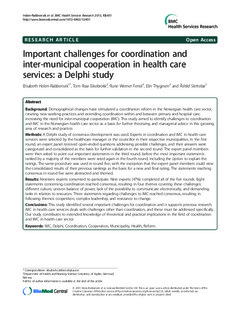| dc.contributor.author | Holen-Rabbersvik, E. | |
| dc.contributor.author | Eikebrokk, T.R. | |
| dc.contributor.author | Fensli, R.W. | |
| dc.contributor.author | Thygesen, E. | |
| dc.contributor.author | Slettebø, Å. | |
| dc.date.accessioned | 2018-02-23T12:00:03Z | |
| dc.date.available | 2018-02-23T12:00:03Z | |
| dc.date.issued | 2013 | |
| dc.identifier.citation | Holen-Rabbersvik, E., Eikebrokk, T. R., Fensli, R. W., Thygesen, E. & Slettebø, Å. (2013). Important challenges for coordination and inter-municipal cooperation in health care services: A Delphi study. BMC Health Services Research, 13(451). | nb_NO |
| dc.identifier.uri | http://hdl.handle.net/11250/2486734 | |
| dc.description.abstract | Background: Demographical changes have stimulated a coordination reform in the Norwegian health care sector, creating new working practices and extending coordination within and between primary and hospital care, increasing the need for inter-municipal cooperation (IMC). This study aimed to identify challenges to coordination and IMC in the Norwegian health care sector as a basis for further theorizing and managerial advice in this growing area of research and practice.
Methods: A Delphi study of consensus development was used. Experts in coordination and IMC in health care services were selected by the healthcare manager or the councillor in their respective municipalities. In the first round, an expert panel received open-ended questions addressing possible challenges, and their answers were categorized and consolidated as the basis for further validation in the second round. The expert panel members were then asked to point out important statements in the third round, before the most important statements ranked by a majority of the members were rated again in the fourth round, including the option to explain the ratings. The same procedure was used in round five, with the exception that the expert panel members could view the consolidated results of their previous rankings as the basis for a new and final rating. The statements reaching consensus in round five were abstracted and themed.
Results: Nineteen experts consented to participate. Nine experts (47%) completed all of the five rounds. Eight statements concerning coordination reached consensus, resulting in four themes covering these challenges: different culture, uneven balance of power, lack of the possibility to communicate electronically, and demanding tasks in relation to resources. Three statements regarding challenges to IMC reached consensus, resulting in following themes: coopetition, complex leadership, and resistance to change.
Conclusions: This study identified several important challenges for coordination and it supports previous research. IMC in health care services deals with challenges other than coordination, and these must be addressed specifically. Our study contributes to extended knowledge of theoretical and practical implications in the field of coordination and IMC in health care sector. | nb_NO |
| dc.publisher | BMC Health Services Research | nb_NO |
| dc.rights | Navngivelse 4.0 Internasjonal | |
| dc.rights.uri | http://creativecommons.org/licenses/by/4.0/deed.no | |
| dc.subject | IMC | nb_NO |
| dc.subject | Delphi | nb_NO |
| dc.subject | coordination | nb_NO |
| dc.subject | cooperation | nb_NO |
| dc.subject | municipality | nb_NO |
| dc.subject | health | nb_NO |
| dc.subject | reform | nb_NO |
| dc.title | Important challenges for coordination and inter-municipal cooperation in health care services: A Delphi study | nb_NO |
| dc.type | Journal article | nb_NO |
| dc.source.volume | 13 | nb_NO |
| dc.source.journal | BMC Health Services Research | nb_NO |
| dc.source.issue | 451 | nb_NO |
| dc.identifier.doi | 10.1186/1472-6963-13-451 | |

